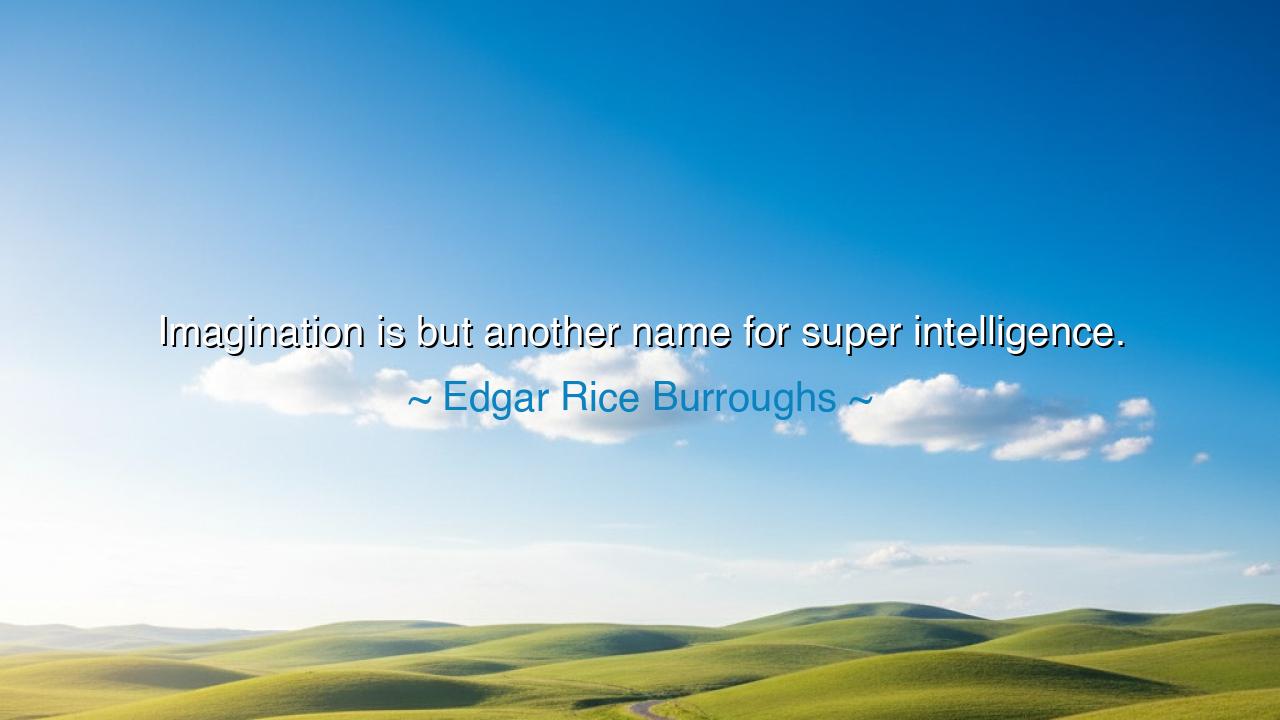
Imagination is but another name for super intelligence.






“Imagination is but another name for super intelligence,” wrote Edgar Rice Burroughs, the creator of Tarzan and John Carter of Mars, a man whose tales carried generations into the jungles of wonder and across the deserts of distant planets. In these few words, he gives voice to a revelation that the ancients would have understood well — that the imagination is not mere fantasy or play, but the highest faculty of the human mind, the divine spark that bridges thought and creation. To imagine is not to dream idly; it is to see what does not yet exist and to bring it forth into the world. In this light, super intelligence is not found in the one who memorizes or calculates, but in the one who dares to conceive beyond what is known.
Burroughs himself lived this truth. He was no scholar of the academies, no philosopher of the ivory tower. Before becoming one of the world’s most beloved authors, he wandered through many failures — a soldier, a salesman, an adventurer — until his imagination called him home. When he wrote of Tarzan, the noble savage raised by apes, or of John Carter, the warrior transported to Mars, he was not merely telling stories; he was exercising a form of intelligence that transcended logic. He saw worlds within the mind’s eye and gave them to mankind. And so, through imagination, he achieved what intellect alone could never — the power to awaken wonder and to shape how entire generations viewed courage, freedom, and discovery.
To say that imagination is super intelligence is to say that the mind’s highest wisdom is creative, not mechanical. A machine can compute; a man can envision. It was Leonardo da Vinci, centuries before Burroughs, who first imagined the wings of flight and the bones of machines that would one day soar through the heavens. He could not build them with the tools of his age, but his imagination was a light that reached beyond the horizon of his time. Centuries later, the Wright brothers, moved by the same visionary spirit, would bring that dream into reality. What joined them across the ages was not intellect alone, but imaginative foresight — the ability to see the invisible and to trust it as truth before proof existed.
This is the kind of super intelligence Burroughs speaks of: the mind that thinks in symbols, stories, and visions — the kind of intelligence that builds civilizations. For every great leap forward in history began first in the imagination of a single soul. It was imagination that taught men to harness fire, to chart the stars, to compose the music of the spheres. It was imagination that made prophets see new worlds of spirit and poets dream of eternal beauty. Without imagination, the mind becomes sterile — capable of analysis, but incapable of creation. The intellect measures what is; imagination reveals what might be.
Yet Burroughs’ words also carry a challenge. For in the modern age, men have come to worship reason and neglect imagination. We train the mind to solve problems, but not to dream. We prize efficiency over vision, calculation over creativity. But the ancients knew that the highest form of wisdom — what they called gnosis or illumination — comes not through data, but through insight, through the inward seeing of the soul. A man of imagination becomes a seer — one who perceives the unseen connections between all things and acts in harmony with them.
Consider the story of Albert Einstein, who once said, “Imagination is more important than knowledge.” Though he was a man of numbers and formulas, his greatest discoveries began not with calculation but with thought experiments — the imaginative vision of riding on a beam of light. From this simple act of wonder came the theory of relativity, which reshaped humanity’s understanding of time and space. His intellect served his imagination, not the other way around. This is what Burroughs meant — that imagination is the crown of intelligence, not its servant.
The lesson, then, is clear: nurture your imagination as the highest form of your mind. Feed it with beauty, challenge it with mystery, and trust it to lead you where reason hesitates to go. Read deeply, dream boldly, and give shape to your visions through work and will. Do not confine your intelligence to what is measurable; let it breathe the air of the infinite. For the super intelligence Burroughs spoke of lies within all who dare to dream without apology — those who look beyond the known world and say, “There is more yet to be discovered.”
And so, remember this wisdom: to imagine is to participate in creation itself. The universe was once an idea in the mind of the divine, and every act of imagination mirrors that first act of genesis. When you imagine, you touch eternity; when you create, you make the invisible real. Thus, imagination is not only super intelligence — it is the divine fire within the human heart, the light that forever beckons mankind to climb higher, to see further, and to build the worlds that live first in the soul.






AAdministratorAdministrator
Welcome, honored guests. Please leave a comment, we will respond soon